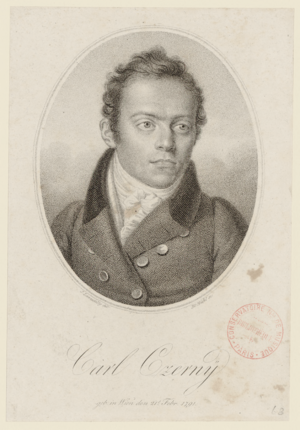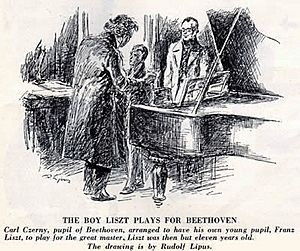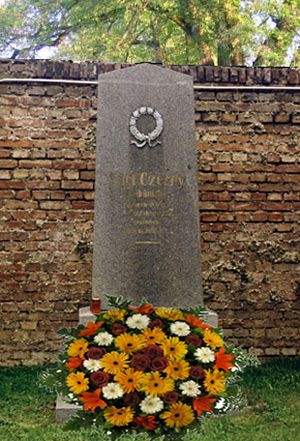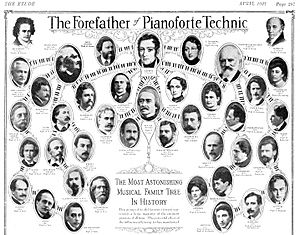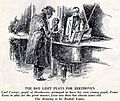Carl Czerny facts for kids
Quick facts for kids
Carl Czerny
|
|
|---|---|
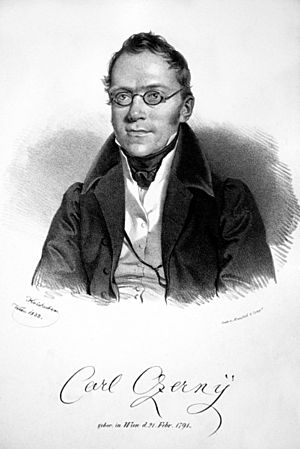
Carl Czerny, lithograph by Josef Kriehuber, 1833
|
|
| Born | 21 February 1791 |
| Died | 15 July 1857 (aged 66) Vienna, Austria
|
| Resting place | Vienna Central Cemetery |
Carl Czerny (German: [ˈtʃɛʁniː]; born February 21, 1791 – died July 15, 1857) was an Austrian composer, teacher, and pianist. He was of Czech background. His music connects the end of the Classical music era with the start of the Romantic era.
Czerny wrote over a thousand musical pieces. His books of piano studies are still used widely today to teach piano. He was also one of Ludwig van Beethoven's most famous students.
Contents
Early Life and Learning
A Young Talent
Carl Czerny was born in Vienna, Austria. His father was from the Czech Republic, and his mother was from Moravia. His parents spoke Czech with him at home. Music was in his family: his grandfather was a violinist, and his father was an oboist, organist, and pianist.
Czerny was a child prodigy. He started playing the piano at age three and began composing music at age seven. His father was his first piano teacher. He taught Carl the music of Bach, Haydn, and Mozart. Carl gave his first public performance in 1800. He played Mozart's Piano Concerto No. 24.
Learning from Beethoven
In 1801, when Carl was 10, a composer named Wenzel Krumpholz arranged for him to meet Ludwig van Beethoven. Beethoven asked Czerny to play his Pathétique Sonata and Adelaide. Beethoven was very impressed. He accepted Czerny as his student.
Czerny studied with Beethoven until 1804 and sometimes after that. He greatly admired Beethoven's skill at making up music on the spot. He also admired Beethoven's quick playing and calm manner during performances.
Czerny's writings give us important details about Beethoven during this time. Czerny was one of the first to notice signs of Beethoven's deafness. He wrote that Beethoven had cotton in his ears.
Beethoven chose Czerny to play the piano for the first performance of his Piano Concerto No. 1 in 1806. In 1812, at age 21, Czerny performed Beethoven's famous "Emperor" Piano Concerto in Vienna for the first time. Czerny could play almost all of Beethoven's piano works from memory. He often played them at Prince Lichnowsky's palace. Czerny and Beethoven remained friends throughout their lives. Czerny also gave piano lessons to Beethoven's nephew, Carl.
Later Career
Teacher and Composer
At age fifteen, Czerny started a very successful career as a teacher. He based his teaching methods on what he learned from Beethoven and Muzio Clementi. Czerny taught up to twelve lessons a day in the homes of wealthy families in Vienna.
Many famous pianists were his students. His most famous student was Franz Liszt. Czerny trained Liszt using works by Beethoven, Clementi, Ignaz Moscheles, and Johann Sebastian Bach. The Liszt family lived on the same street as Czerny. Czerny was so impressed by young Liszt that he taught him for free. Liszt later played Czerny's music in his concerts in Paris.
Czerny helped Liszt meet Beethoven in 1823. Beethoven usually didn't like child prodigies. But he was impressed enough with Liszt to give him a kiss on the forehead. Liszt and Czerny remained close. In 1852, Liszt dedicated his famous Études d'exécution transcendante to Czerny.
Czerny mostly stayed in Vienna. He only traveled to Italy, France, and England. After 1840, Czerny focused only on composing. He wrote many piano exercises to help pianists improve their skills. These studies are used by beginners and advanced players alike.
Death
Czerny died in Vienna when he was 66 years old. He never married and had no close family. He left his large fortune to charities, including one for the deaf. He also left money to his housekeeper and to the Society of Friends of Music in Vienna.
His Music
What He Composed
Czerny wrote a huge amount of music, over a thousand pieces. His works include not only piano music but also church music, symphonies, concertos, songs, and chamber music.
The most well-known part of Czerny's music is his many piano studies. These include famous ones like The School of Velocity and The Art of Finger Dexterity. He was one of the first composers to use the word "étude" (which means "study") for a musical piece. Czerny also arranged many popular opera tunes for piano.
Most of Czerny's "serious music," like his church music and symphonies, were never published. They are kept in Vienna by the Society for the Friends of Music.
Piano Music
Czerny's piano sonatas are seen as a link between Beethoven's and Liszt's works. They mix traditional sonata form with older styles, like the fugato (a type of musical chase). Some pianists have recorded these sonatas.
His piano nocturnes (night pieces) have some elements found in Chopin's nocturnes. These include a flowing rhythm and a personal feeling. Chopin met Czerny in Vienna in 1828. He might have been influenced by Czerny's nocturnes.
Czerny wrote about 180 pieces called "Variations." One famous one is La Ricordanza, which the famous pianist Vladimir Horowitz recorded. Czerny used his own tunes and tunes from other composers for his variations. These composers included Mozart, Haydn, and Schubert. His variations were for solo piano, or for four, six, or eight hands. Some even had orchestra or string quartet parts.
Czerny was one of 50 composers who wrote a variation on a theme by Anton Diabelli. He also wrote a short ending piece for the collection. Beethoven also wrote 33 variations on the same theme. Czerny also worked with Liszt and Chopin on a set of variations for piano called Hexameron in 1837.
Other Compositions
Czerny wrote seven symphonies. Recordings of these began in the 1990s. More recently, two new symphonies and other orchestral pieces have been discovered.
Czerny also wrote a lot of chamber music, which usually includes the piano. This includes trios and quintets for strings and piano, and sonatas for violin and piano. He also wrote music for flute, horn, and other instruments. He even wrote string quartets that don't have a piano. These have become more popular recently.
Czerny was a religious Catholic. He composed many religious pieces, including Masses and hymns.
His Legacy
His Influence
Czerny is seen as a key figure in modern piano technique. Many of his students, like Theodor Leschetizky, Franz Liszt, and Theodor Kullak, became famous teachers themselves. They passed on Czerny's teaching methods to their own students.
The US music magazine The Etude showed in 1927 how Czerny was like the "father" of modern piano technique. His influence continues to this day through a long line of pianists. For example:
- Wanda Landowska learned from Moritz Moszkowski, who learned from Theodor Kullak, who learned from Czerny.
- Sergei Prokofiev learned from Anna Yesipova, who learned from Theodor Leschetizky, who learned from Czerny.
- Claudio Arrau learned from Martin Krause, who learned from Liszt, who learned from Czerny.
- Daniel Barenboim learned from Edwin Fischer, who learned from Martin Krause, who learned from Liszt, who learned from Czerny.
- Sergei Rachmaninoff learned from Alexander Siloti, who learned from Liszt, who learned from Czerny.
Czerny wrote an essay on how to play Beethoven's piano sonatas correctly. Johannes Brahms praised this essay. He said Czerny was a careful student of Beethoven. Liszt also wrote that Czerny played Beethoven's music with great understanding. He added that Czerny helped improve piano technique through his teaching and works.
Czerny also helped decide which classical piano pieces were most important. In his Theoretico-Practical Piano School (1847), he listed the most important piano works of the previous eighty years. This list included works by Mozart, Clementi, Chopin, Schumann, Liszt, Schubert, and Mendelssohn.
His Reputation
For a long time after Czerny's death, people often had negative views about his music. However, some musicians, like Anton Kuerti, Brahms, and Leon Botstein, have offered more positive opinions. Even Igor Stravinsky admired Czerny as a composer, not just a teacher.
Images for kids
See also
 In Spanish: Carl Czerny para niños
In Spanish: Carl Czerny para niños
 | Delilah Pierce |
 | Gordon Parks |
 | Augusta Savage |
 | Charles Ethan Porter |


